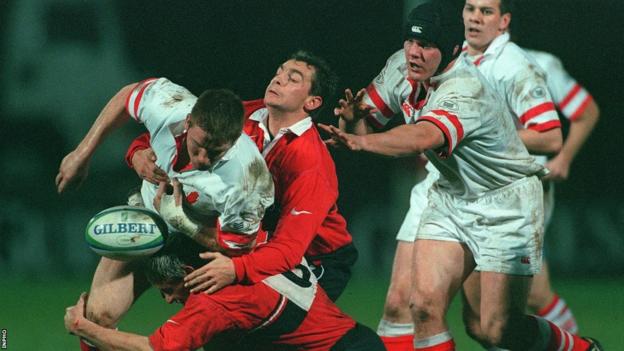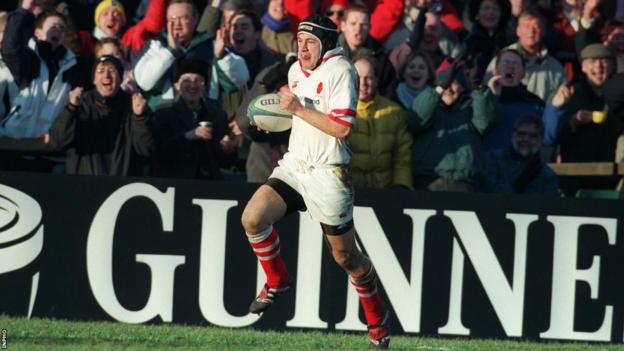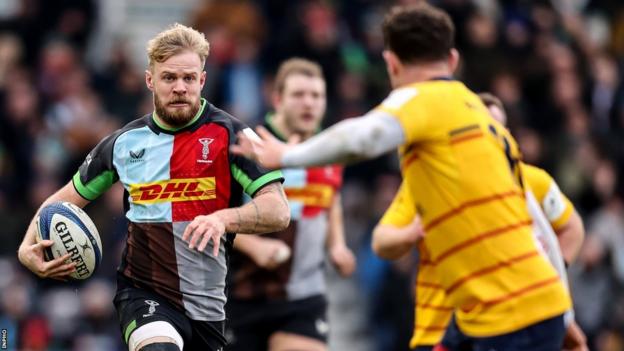

“There is always that embrace, that hug, that handshake. That’s something that will never go away.”
Tony McWhirter sounds happy. A few hours after this conversation, he’ll be back with Ulster’s class of ’99 and they’ll all be wondering where those 25 years went as they renew a “tight bond” which he says will never be broken.
“I tried on my suit trousers the other night. Let’s just say, I haven’t eaten too much today,” he jokes as he is about to dash to pick up the kids from school before heading to the La Mon Hotel to meet the boys again at a special anniversary gala dinner.
“We had a bit of get-together at Ravenhill before the Toulouse match a couple of weeks ago and (our coach) Harry Williams was in fine form, looking well.
“It’s not always possible. Allen Clarke is working out in Seattle at the minute. Simon Mason and Justin Fitzpatrick are back in England.
“But the guys who are home based, we try and catch up three or four times a year.
“There’s a bit of golf and a few trips. Stewart Duncan organised one last year where some of the guys were to Madrid and played a bit of rugby believe it or not. Not all of us either went or took part in it mind you.”
‘The vivid memories for me are pre-match’
Asked about his recollections of the late January day when Ulster became the first Irish province to win the European Cup as the overcome Colomiers 21-6 at the then Lansdowne Road, McWhirter, who was then 24, confesses he doesn’t “really remember a lot about the match itself”.
“The vivid memories for me were probably pre-match in terms of the Berkeley Court Hotel, which isn’t there any more but was synonymous with pre-match and teams staying in it with it being close to Lansdowne Road.
“I remember coming down the staircase of the hotel, the foyer was absolutely rammed and there was lots of applause, flags.
“From there, the bus trip, rather than coming out of the hotel and taking the short journey down the couple of hundred yards down to Lansdowne, we went left and took the long way and wrong way round I suppose.
“The fans were there and they were all waving to the bus as we had that longer route. It was very emotive and emotional scenes. I think it just set the mood and set the tone for later on that afternoon.”

After the stirring quarter-final and semi-final victories over French giants Toulouse and Stade Francais, Ulster went into the final as favourites against unheralded Colomiers.
But with coach Williams, team manager John Kinnear and injured skipper Mark McCall all in the players’ ears about the danger of complacency, the job was duly done as full-back Mason finished off his remarkable kicking campaign by slotting six penalties and David Humphreys notched a drop goal.
“Having got that far, completing the journey was what it was all about,” adds McWhirter, who played at number eight.
“The campaign had really taken off and caught the imagination. From playing in front of small numbers at the start of the competition, suddenly you had huge crowds at Ravenhill for the Toulouse (11,500) and Stade Francais (20,000) games.
“Then you’re playing in front of your kith and kin at Lansdowne Road – 50,000 partisan Ulster people and Irish rugby supporting you as well.
“By the end of it, it seemed to be a natural transition from Ulster as an amateur team and then Ulster really progressing and developing into a professional set-up.”
Ulster had players ‘holding down full-time jobs’
While rugby union had gone professional four years earlier, there were still genuine amateurs in the Ulster squad on final day.
Scrum-half Andrew Matchett and blindside flanker Stephen McKinty had day jobs, as had replacements Gary Leslie, Derek Topping and Stewart Duncan.
“You’ve got to take your hats off to those lads they were holding down full-time jobs which they had been in for a number of years and didn’t want to give those up,” adds McWhirter, who works as a regular co-commentator for BBC Sport Northern Ireland alongside the doyen of the mic Jim Neilly.
“At the start of the season, the professional guys were doing their own training, gym or fitness work as a professional group in the morning and then we would have trained in the evening to basically let the amateur guys be part of that.
“But after we lost a couple of games, a decision was taken to flip that in October so that we would train during the day.
“Some of the guys were coming in and doing gym work at six o’clock in the morning and then back for pitch sessions later on that day. They really had to fit their job around the rugby.
“It can’t have been easy for them in terms of sacrifice for their jobs but also in terms of the family and kids as well.
“It was something that the professional players in the team were very much aware of and very thankful for.”

Mason and Humphreys’ scoring exploits in notching all but five of Ulster’s 69 points in their three knockout games meant they inevitably got most of the media headlines but the other squad members were equally in awe of the duo’s displays.
Incidentally, the other five points came from a Stephen McKinty try in the 33-27 semi-final win at a bursting-to-the-seams Ravenhill.
“David was playing really good rugby and on the back of that got himself back in the Irish team and Mason was just untouchable at that stage.
“But we very much a team. Most of the forwards were reasonably unheralded in terms of what was there but at no point did anybody feel that they weren’t getting the kudos that they were deserving of.
“It was very much a case of, ‘here’s a job. How do we do it? What’s the process?’.”
The grainy YouTube footage of Humphreys’ memorable try in the semi-final win over Stade is still worth a look as his chip over the top from the edge of his own 22 was gathered by Sheldon Coulter, who burst to the 10-metre line before delivering a perfectly-weighted pass to the charging fly-half. Humphreys still had to run from halfway but there was no stopping him.
“Jim Neilly still classifies that as being his favourite try in terms of what he’s seen at Ravenhill. That score will last the test of time,” adds McWhirter.
Will Ulster ever return to those heights?
When you watch those scenes, it puts Ulster recent European struggles into sharp focus and on BBC Radio Ulster two weeks ago, McWhirter dubbed Ulster as the “ultimate Jekyll and Hyde team” who can follow beating Leinster on the home turf with quite frankly astonishing ineptitude a couple of weeks later.
A week on from the self-inflicted 47-19 hammering by Harlequins which consigned Ulster to the Challenge Cup, McWhirter had perked up somewhat although he did have a good night to good forward to.
“In today’s world, it’s much harder. You’ve got the French and English sides of course but with the South African teams now involved as well, it just makes it one or two degrees harder than what it was before.
“Ulster have got to try and be as organic as they can. They have to try and promote the game through grassroots, schools and clubs…. and the generational talent that is there has to be coached well for these guys to come through. And they have to want to play rugby and play for Ulster.
“But in the schools rugby that I watch – and that’s quite a lot – there’s an awful lot of talent there.
“It’s about harnessing that, growing it and making it competitive and been able to feed that through to the senior team.

“With a little bit of luck and some good foreign signings, there is no reason why Ulster can’t start to climb back to whether they feel they belong.
“But last week from a coaching point of view, if you’re sitting in the stands watching those individual errors, you would be apoplectic.
“And it doesn’t matter how much time Dan McFarland and the coaches spend preparing a team, if you are making some of the errors on the pitch individually that some guys were making last week, it makes it even harder than if you are going out with a level playing field.
“Just in general, the standards need to be lifted and the players have to have a look at themselves as well.”
Prior to the Covid-19 pandemic, McWhirter did some coaching with the Ulster A team and while outside of his dentistry practice and BBC duties, he is being kept busy ferrying his daughters to their sporting endeavours, passing on his knowledge and experience to other players is something he would be keen to revisit in the future.
“Doing the stuff for the BBC is good fun. I try not to take it too seriously but that takes up weekends and time as well in terms of doing a bit of preparation for it so I’m busy.
“There’s no coaching for me at the minute but maybe in the future, if a bit more time appears, it’s something that I’d love to get back into.”